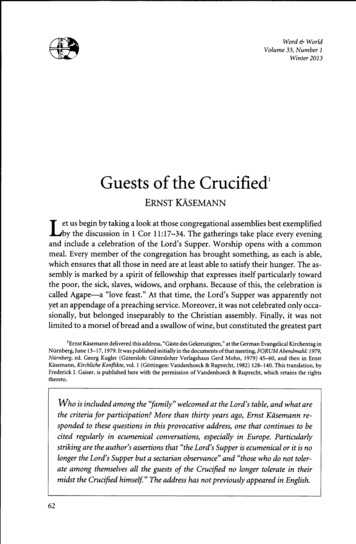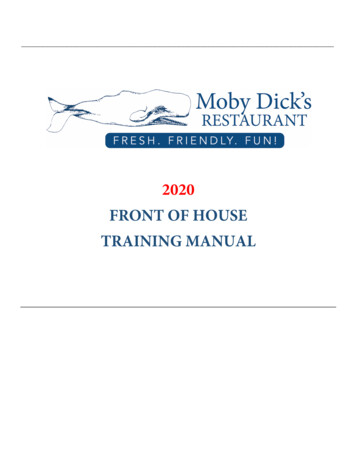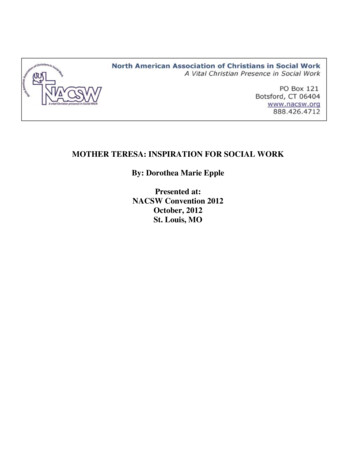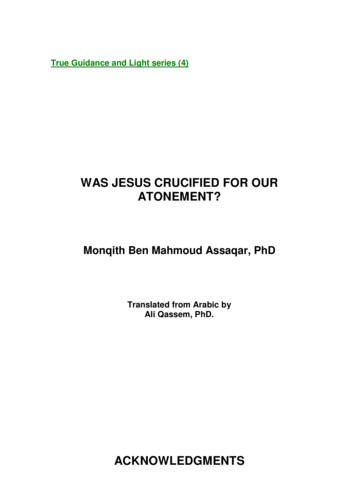
Transcription
Word & WorldVolume 33, Number 1Winter 2013Guests of the Crucified1ERNST KÄSEMANNet us begin by taking a look at those congregational assemblies best exemplifiedby the discussion in 1 Cor 11:17-34. The gatherings take place every eveningand include a celebration of the Lord’s Supper. Worship opens with a commonmeal. Every member of the congregation has brought something, as each is able,which ensures that all those in need are at least able to satisfy their hunger. The assembly is marked by a spirit of fellowship that expresses itself particularly towardthe poor, the sick, slaves, widows, and orphans. Because of this, the celebration iscalled Agape—a “love feast.” At that time, the Lord’s Supper was apparently notyet an appendage of a preaching service. Moreover, it was not celebrated only occasionally, but belonged inseparably to the Christian assembly. Finally, it was notlimited to a morsel of bread and a swallow of wine, but constituted the greatest partL1Ernst Käsemann delivered this address, “Gäste des Gekreuzigten,” at the German Evangelical Kirchentag inNürnberg, June 13-17,1979. It was published initially in the documents ofthat meeting, FORUM Abendmahl: 1979,Nürnberg, ed. Georg Kugler (Gütersloh: Gütersloher Verlagshaus Gerd Mohn, 1979) 45-60, and then in ErnstKäsemann, Kirchliche Konflikte, vol. 1 (Göttingen: Vandenhoeck & Ruprecht, 1982) 128-140. This translation, byFrederick J. Gaiser, is published here with the permission o f Vandenhoeck & Ruprecht, which retains the rightsthereto.W ho is included among the “fam ily”welcomed at the Lord's table, and what arethe criteria for participation? More than thirty years ago, Ernst Käsemann responded to these questions in this provocative address, one that continues to becited regularly in ecumenical conversations, especially in Europe. Particularlystriking are the author's assertions th a t“the Lord's Supper is ecumenical or it is nolonger the Lord's Supper but a sectarian observance" and “those who do not tolerate among themselves all the guests of the Crucified no longer tolerate in theirmidst the Crucified himself" The address has not previously appeared in English.62
Guests of the Crucifiedof a regular meal. Just as the heart and soul were refreshed, so was the body—andall of that in a feast in which individual members grew into the fellowship of thebody of Christ.In 1 Cor 11:25, Paul says somewhat oddly that the cup was passed around “after supper.” That could mean that the bread was given sometime toward the beginning of the love feast, while the wine was offered at the end. In that case, the Lord’sSupper would have framed a worship service that included the proclamation of theprophets and instruction in the Scriptures along with common prayer and praise.At least in Paul’s missionary area, then, the early Christian congregation gathereddaily, and its members, in the presence of the Lord, became guests of the Crucifiedand witnesses of the risen Christ. In their this-worldly eating they anticipated already the celebration of the kingdom of God and understood themselves to be jubilant representatives of the heavenly congregation.a t least in Paul's missionary area, the early Christian congregationgathered daily, and its members, in the presence o f the Lord,became guests o f the Crucified and witnesses o f the risen ChristWe must hold this picture firmly in our mind in order to understand whatnow seems incomprehensible to us. The apostle speaks about the Lord’s Supperhere only because it is being abused in Corinth. Apparently, the worship of theearly church was not yet so formal (perhaps even unearthly) as is often the casewith us. The Corinthian congregation was composed primarily of those at the lowest social levels in this harbor city. Many could come to worship only when theywere released by their employers after a very hard day or when they were able toslip away from their large household. So it was natural that they often came late.But there were also more affluent members of the congregation who controlledtheir own schedules and who became impatient when they had to wait too long fortheir sisters and brothers, especially when they were not sure whether those otherswere coming at all. They had brought food and drink with them and, because theywere hungry, they began to eat. The more they celebrated, the greater their exuberance. For them, too, it was not merely a matter of satisfying their hunger. They sawthemselves as guests of the coming kingdom of heaven; yet, remaining entirely human, they behaved not at all like part of a bourgeois society with a strict moral order and ideal ethical principles. Many of them were more interested in puttingaside everyday orders and rules than in defending them. They hungered andthirsted for freedom from the oppression of patrons and slaveholders no less thanfor physical food; they wanted to forget their worldly troubles, to be able at last topraise with the angels the triumphant justice of God. Those of us who have ourselves been grasped by rebellious impatience cannot fail to understand when outcast members of society break out of the usual social conventions in order todemonstrate their place as citizens of heaven, how they even become intoxicated in63
Käsemanntheir enthusiastic (schwärmerisch) exuberance and leave those brothers and sisterswho come late only the remnants of the meal that was meant for all. Naturally, onecannot condone that. But the question Paul sets before the Corinthian congregation applies to us all: When does one become a worthy guest at Jesus’ table? Wemust answer that question from a variety of perspectives.l. T h e Lo r d ’s Su p p e rIt will be helpful to speak only of “the Lord’s Supper.” All other descriptionsare too indefinite and therefore allow misunderstandings. To be sure, it is not falsewhen we usually just say “the Supper” (Abendmahl). Early Christian usage and thewords of institution justify this term. Nevertheless, it is then left to us to determinewhich perceptions we connect with the term, raising thereby the danger that ourpersonal expectations, needs, and experiences prove decisive. This was already truefor the Corinthians. They celebrated the in-breaking freedom of the reign of Godand, intoxicated by that, they forgot their way on earth, forgot their poorer brothers and sisters. Our own overriding concern at the Lord’s Supper might be contrition over our guilt and over our many vain attempts to begin a new life with God,with our parents, our spouses, our children, and our neighbors—or even to cometo terms with ourselves. Who would want to exclude either of these concerns fromthe celebration, which certainly offers place for both bliss and remorse and whichwants to provide both freedom and forgiveness? But dare either of these be at thecenter? Would not this make either our sinful or our pious humanity, our ownlongings and distress, overshadow the one who says, “My body, my blood, foryou”? It is essential that he and he alone remain at the center, that he and he alonebe heard and received.What happens when we make ourselves most important can be seen today byall: fewer and fewer guests find their way to Jesus’ table, and they come less and lessoften.2To “go to communion” becomes the sign of particularly pious groups, who,though they cannot replace the whole congregation, see themselves nevertheless asthe true congregation and lapse all too easily into sectarian arrogance. Where it isno longer taken for granted that the entire congregation regularly responds to theinvitation of its Lord, the meal easily becomes marginalized, a place of refuge fortrue believers, and thus a dividing wall in the middle of the Christian communityand a barricade against the world that God wants to bring home. Then Christ is leftin the lurch, as he was by his disciples at Golgotha. What matters is to look to him,to hear him, to receive him, to allow him to act upon us. He will bring with himwhatever else we need. Celebrating the Lord’s Supper means to be called into theLord’s presence, before his face. That is the simplest, most comprehensive, andmost beautiful description of his disciples, which even the hosts of heaven cannotoutdo: we stand in the presence of Jesus.2Translator’s note: In the Protestant churches of Käsemann’s day, com munion in many churches was celebrated not during, but after the regular service. Often, only a small group remained to participate.64
Guests of the CrucifiedBut will this statement suffice? Perhaps many will find it too simple. Canwe—dare we—leap over the theological controversies that have been associatedwith the words of institution and that still divide denominations from one anotheras though such disputes concern only specialists? Yet, the experts would be amazedand horrified were they to take notice of the fact that they and their theological debates are no longer understood nor supported by the so-called laity. The gap between them and their own congregations is often greater than that between themand other denominations. That does not mean, however, that dogmatics can bepronounced superfluous and that praxis should always be given precedence. Thereis no life and no discipleship that can afford to give up on thinking, on distinguishing between what is true and false, and on clarifying precisely the nature of itsheartfelt faith. On the other hand, one dare not abandon life and discipleship tothere are incontrovertibly some theologians andecclesiastical administrations fo r whom denominationaldifferences in this broken world are more im portant thanour brotherhood with the Crucifiedthe pedants or, worse, the heresy hunters, fanatics who want to stamp us all in theirimage (or perhaps after their own illusions) and put everyone in the congregationinto the same uniform. One can deny food to the hungry because one is busy determining its nutritional value with analyses and tests. There are incontrovertiblysome theologians and ecclesiastical administrations for whom denominational differences in this broken world are more important than our brotherhood with theCrucified. That which we reverentially, yet perhaps dubiously, call “sacrament” issometimes so overblown that the Lord who gave it to us takes a back seat. Any childwho hears the words “My body, my blood, for you” understands that the Lord’sSupper is not about swearing allegiance to a religious party or worldview, nor toparticular ecclesiastical traditions or the speculations of our forebears. Neither isbeing drawn into mystical depths or metaphysical heights to everyone’s taste andcertainly not everyone’s idea of salvation. At Jesus’ table, however, no one is sparedfrom hearing in the words of institution— quite childlike—that our Lord wants tocome to us here, to move in with us, to make us his own in order to lay claim to ourhearts and our lives. Can one expect more? Believe more? Know more? Is this notenough for any of us? Is this not already to experience heavenly bliss here on earth,that our Lord gives himself to us and brings us, with this meal, into his presence fortime and eternity?2. G uests o f t h e C r u c ifie d“Lord’s Supper” was our first keyword. A second follows: “Guests of the Crucified.” It is not without reason that the one who gives himself to us does so with65
Käsemannthe words, “My body, my blood, for you.” Even after Easter, our Lord deals with usby pointing us to the cross. He will never do otherwise. For even on the Last Dayhis enemies will recognize him by his wounds; these are what distinguish him fromall gods and all secular rulers. We learn who Jesus truly is only from Golgotha.Here, like nowhere else, we learn what it means to be truly God and truly human.Christ must enter into death—more, into the hell of hatred, scorn, and ridicule—in order to help us. Who can affirm this without losing, at their very core, allillusions about themselves and this world? Whoever has stood beneath the stake ofthe Crucified knows that salvation does not arise from our own reason andstrength. At the same time, we become aware of a God who sheds his glory anddons the dress of a slave in order to become like those who have forsaken him, whorebel and entrench themselves against him, those idolatrously bent on power andpleasure. Golgotha is the place where the depths of forlornness meet the depths ofself-denying compassion. That is why all of us, each in our own way, can find hereboth ourselves and our Lord. Those who here join in the hatred and ridicule willcontinue to place law and order and status quo above humanity. Those who lookon indifferently will make their own self-interest the measure of all things. Thosewho here see the truth about themselves and who learn to cry with Jesus, “My God,my God,” will continue to keep Golgotha before their eyes, letting it determinetheir relation to those near and far, to the forces and powers, to the rules of societyand the political necessities of our time. Golgotha was and remains a place of bothblessing and curse, a place where, even among Christian churches, the spirits divide—even though not all have taken notice. For the true church and the falsechurch, otherwise scarcely distinguishable, divide when it comes to saying yes toJesus’ cross, to taking the Crucified Lord as their own.To be guests o f the crucified is n o ta n experience only forpious hours spent behind the thick walls o f our churches inthe circle o f like-minded worshipers. To become guests o fthe Crucified is a t the same tim e both the pilgrim journeyand the goal fo r Jesus’followers.Of religious movements there are enough and to spare. Many are more profound, stronger, and more fascinating than Christianity, so again and again Christian communities squint to the right or the left, make compromises, borrow thisand that, and betray Golgotha. The truth of the gospel, however, binds the kingdom of God to Jesus’ passion here on earth, in the shadow of which alone the godless experience salvation. To be guests of the crucified is not an experience onlyfor pious hours spent behind the thick walls of our churches in the circle of likeminded worshipers. To become guests of the Crucified is at the same time both thepilgrim journey and the goal for Jesus’ followers. That is what Paul uses to counterthe Corinthian enthusiasts. There is nothing wrong with seeing the heavens open66
Guests of the Crucifiedand the Holy Spirit coming upon the congregation, exercising free reign within it.But everything depends upon whether or not the open heavens still display the image of the Crucified or only the fulfillment of our own dreams; whether the Spiritremains that power that gives us the Nazarene as our Lord or whether it simplyalienates us from everyday life, allowing us to forget the battle in which we are to beengaged.Apparently, the Corinthians did not understand themselves to be guests ofthe Crucified when they celebrated the Lord’s Supper. Instead, since some of themwould have belonged to mystery religions before their conversion, they saw Christas some kind of pagan redeemer, leading their souls away from the control of thestars and demonic threats and into heavenly freedom and immortality. That madesense. After all, Christ, like them, had lived as a proletarian, and he, like countlessrebellious slaves, had been crucified by the Romans as a terrorist. All the more fascinating then was the news that this one, who had been condemned on earth, hadbroken the power of death and fate and now wanted to bring his faithful followerswith him to that place where suffering, cries, and tears were no more. In Corinth,the Lord’s Supper had become a mystery celebration in which participants reexperienced Christ’s own journey—called through deepest indignity into the glory of thevictor, and now, in union with him, given participation in heaven itself.Now 1900 years have passed. But does that mean the way the Corinthians celebrated the Lord’s Supper has passed? Don’t we still see the cross primarily as a waystation on the journey to perfection? Don’t we see Jesus as an example of how suffering serves to test us in preparation for what we will be granted in the comingbliss? Don’t we regard his table as a place of rest for the tired, a religious elevationabove our everyday life, a view into our eternal home? Those things ought not bedisparaged; but if the Lord’s Supper offers nothing else it remains for us too a mystery celebration in which God and pious souls come together, leaving the world behind. This is the primary issue: Dare we in the Lord’s Supper exclude this worldand anticipate heaven as though we belong already to the band of the perfected? Toput it polemically, yet necessarily: Do we, at least in our Western churches, not tooquickly hear the call to gather together when what is needed is the call to continuemarching on? Are our worship services not too closely focused on our own needs(sometimes even imagined ones)—without first having tirelessly resisted them—while forgetting that entire continents have become stomping grounds of the demons? How can we celebrate the Lord’s Supper in an affluent society while increasingly accommodating ourselves to the surrounding conditions, not even noticingour idols, much less naming them and daring to offer resistance?It is understandable that the Corinthian congregation, in the misery of theslums, longed for heavenly freedom. It is right and in accord with Jesus’ will thatthose who are exhausted, broken, lonely, and deathly ill still find consolation in theinvitation, “Come to me, all you that are weary and are carrying heavy burdens,”but the majority of those who attend our churches find themselves in a different67
Käsemannsituation. For them, everyday life is defined by a society that dances around thegolden calf, that relies on the police to protect its property and privilege, on NATOto defend it from the communist danger, and hopes that a nice God will let themlive without serious troubles and preferably die in peace. Dare the guests of theCrucified seek to justify this mode of existence and ask that God protect it—evenon Sunday at the table of Jesus—expecting that in the end God will crown it with aplace in Abraham’s bosom? A Kirchentag3that lacks the confidence to raise thisquestion loud and clear is not worthy of the name.3. O n B e in g U n w o r t h yPaul dared to raise such questions with his proletarian congregation in Corinth. He must have shocked them to the core when he proclaimed them “unworthy”—they who vaunted their heavenly status. That is the third keyword for us toconsider. It takes us, however, into dangerous territory, where countless Christiansin every age have gotten lost and which has so terrified others that they have preferred to avoid the Lord’s Supper altogether. So, before we delve into the matter itself, we will have to “demythologize” a little.Today, we label “unworthy” something that violates proper decorum or sinsagainst our notions of morality. Therefore, millions have asked themselves againand again whether they are able to fulfill the external and internal conditions thatare appropriate to the Lord’s table or that appear appropriate to our standard conventions. Those who are older will remember that their parents, or certainly theirgrandparents, went to communion only in black clothing or even in a frock coatand top hat, circling the altar as a procession of penitents. The organ played softly,and people worked at not only appearing to be conscious of their guilt, but actuallyto be so in the depths of their being. The more they were able to do that, the moreworthy was the celebration and the more worthy the participants.We have no right to look down on such centuries-long custom. Devout worshipers honored their Lord in this manner and, at the same time, bore witness thatthey acknowledged God as their judge. Anyone who has been in a church completely filled with such guests at Jesus’ table will never again call human piety intoquestion without also showing it their respect. However, such devout piety is notself-evidently “evangelical.” There is an unmistakable contradiction when Jesus’congregation makes so much fuss about its own worthiness, coming to the Lord’sSupper with fear and trembling, while their Master is busy gathering his guestsfrom the highways and byways, including Samaritans, pagans, tax collectors, andprostitutes, inviting them not into fear but into joy. In his day, those whom theJews regarded as particularly worthy, like the scribes and the Pharisees, were notwell represented among his followers. For a long time, those who would make up3Translator’s note: The German “Kirchentag” or “Church Congress” is a biennial meeting (a lay movement)that serves to gather Christians in order to strengthen their faith and to prepare them to take responsibility and bearwitness in the world. The first Kirchentag was held in 1949.68
Guests of the Crucifiedwhat might be called “good society” were more the exception than the rule at histable. What happened to make such questionable characters appear less and lessfrequently at worship (at least visibly)? What happened to make the Christiancommunity, at least in our part of the world, represent only the respectablebourgeoisie?there is an unmistakable contradiction when Jesus' congregationmakes so much fuss about its own worthinessy coming to the Lord'sSupper with fear and trembling, while their M aster is busygathering his guests from the highways and byways, includingSamaritans, pagans, tax collectorsy and prostitutesWe will have to go deeper. Certainly, we all have need from time to time totake stock of ourselves and come to terms with what we have done and failed to do.Those who never critically examine their own lives and hold their own personaljudgment day may well forget their own humanity and be more prone to ascribeguilt and error to others. On the other hand, even the strictest self-examinationwill scarcely penetrate the depths of our heart with its mixture of spite, desperation, and the propensity to deceive ourselves and others. We can only come beforethe eternal judge without dread because he has already opened his arms to us likethe father of the prodigal son. We and our forebears have obviously misunderstood the invitation to Jesus’ table if we have not kept in mind that Christ seeks thefallen, the weak, and the guilty, gathering to himself only those who are unworthybefore God. Brushing off the dust and removing the smudges cannot change thenature of our old selves. Since the one who becomes our brother was himself calledthe most despised and most unworthy, we will have to follow him in his ignobility,exposing ourselves without reservation to his light, and trust our salvation entirelyto his compassion. Only those who do not deserve it sit at Jesus’ table.Unworthy meant something different for Paul than in our world. For him,the word was taken from the language of commerce where it meant that the twopans of a scale were not of equal weight. Our “doesn’t measure up” would have thesame meaning. Thus, the apostle was not referring to the inner condition of themembers of the congregation but rather to their behavior at the love feast. What“doesn’t measure up”—that is, what would be contrary to the Lord and his cross—was the behavior of those who didn’t wait for their brothers and sisters at Jesus’ table, leaving those latecomers to eat the leftovers or to go hungry, all the while feeling themselves carried away into heaven and noisily announcing their devoutness.There is only one capital offense at the Lord’s Supper, and that is the denial of fellowship. To do that is to betray the one who left his place at the right hand of Godin order to rescue those not so devout from their scorn and abandonment, makingthem members of his realm. For their sake he gave himself up to the power of death69
Käsemannand hell. Thus, the “heathen” were and are those who do not allow those nearest tothem and furthest from them to share in grace, with all its gifts, instead allowingthem to lie in front of their door like Lazarus or, at best, fobbing them off with ahandout. One might praise, pray, and act devout at Jesus’ table and still be a betrayer like Judas—who nevertheless joined in the Lord’s Supper.The practice of fellowship is a characteristic of true worship, and any followerwho leaves a neighbor without care and without love in some hell on earth liveswith a false faith. As Paul says, any such would be guilty of the body and blood ofJesus, creating Golgotha once again in their own way. It is possible to be one withthe angels, anticipating the rule of God on earth, but nevertheless to hear the Judgeon the last day asking, “Where is your brother Abel?”4. No M y s t e r yC e l e b r a t io nThere are consequences to be drawn from all of this. Protestants at leastshould refrain from the misguided and inappropriate talk of a “mystical meal,”which would be suitable only for the celebration of a mystery religion. The mainthing we need to learn from 1 Corinthians is that the table of Jesus is not merelyabout the union of souls with the heavenly Lord. And if we do want to express thatsense of the celebration, we would at least have to be clear that the Lord’s Supper,like baptism, unites us with the heavenly Lord by integrating us into his earthlybody. That is exactly what we see in the verses that frame our text, 1 Cor 10:16-17and 12:12-13. And the text itself says precisely the same thing. The word “soul” isnot there at all. Instead, the text unswervingly emphasizes the physical. People eatand drink rigorously and noisily. The words of institution speak of body and bloodand do so in order to produce physical solidarity.For the apostle, at least in the verses of our text, everything depends on themeal producing and maintaining community; it is celebrated rightly only when thewhole congregation participates in it. That should not be understood legalistically.These days our parishes have become so large that we should encourage holdingthe Lord’s Supper in families, homes, and the so-called base communities—as infact it was in the early church. Nonnegotiable, however, remains the fact that thesedare not become gatherings of the like-minded. When we separate ourselves internally and externally from those followers of Jesus who believe, think, and act inways other than ourselves, we produce sects. Then it is not Christ’s earthly bodythat is built up; instead he becomes the chieftain of an ecclesiastical party, his lordship becomes a domain in which pedants and inquisitors have the last word andwhere the “pious” are left happily among themselves, undisturbed by other brothers and sisters. A Christian community does not wear religious uniforms. Instead,as paradoxical as it sounds, they live in an ongoing situation of mutual familial disturbance. Otherwise, they are not based in Golgotha. Their Lord has not madethem more humane, but doctrinaire and illusionary.If this is where we are, then the Lord’s Supper can now be celebrated only in70
Guests of the Crucifiedpenitence and protest. No one can dispute that throughout the Christian world wesee happening precisely what Paul called despising the body and blood of Jesus,which was punishable with temporal and eternal judgment. In fact, everywhereand unceasingly, Christ’s invitation to come to his table and into his presence iscountermanded by Christians, theologians, ecclesiastical administrations, and denominations, who instead practice and defend the refusal of communion fellowship. There is no justification and no excuse for that. In doing it, God’s name isdesecrated, his kingdom impeded, his will opposed, and all talk of the unity of thechurch is exposed as pious babble. People don’t want to be unified—or only whenthe others ideologically capitulate. The so-called laity are gradually catching on tothis. That is why they increasingly distance themselves from Jesus’ table or comeclandestinely to an ecumenical service, contrary to the precepts of their denomina ־ tions and spiritual advisers. That is their protest against the ruling theologies andthe ecclesiastical powers-that-be. The Lord’s Supper is ecumenical or it is no longerthe Lord’s Supper but a sectarian observance, because the Crucified calls to his table all for whom he died. The dogmatics were written later. If even Judas was notexcluded and if our baptisms are by and large mutually recognized, sacrilege iscommitted not by those who celebrate along with other brothers and sisters but bythose who deny communion to those others. Before the church calls others to repentance, it must first repent of these actions. For those who do not tolerate amongthemselves all the guests of the Crucified no longer tolerate in their midst theCrucified himself. They are no longer part of the body of Christ on earth, butrepresent instead a closed society and a religious interest group.the Lord's Supper is ecumenical or it is no longer the Lord'sSupper but a sectarian observance, because the Crucifiedcalls to his table all fo r whom he died5. A n O p e n C o m m u n it yFinally, let us sharpen the point. I have deliberately spoken about a closed society since, at least in the churches of white culture, that term best describes ournormal communion celebrations. But that was precisely not the case with the lovefeasts of early Christian worship. There, catechumens and even unbelievers couldalso participate. No doubt, some from the slums of the harbor city found their wayto Jesus’ table merely to satisfy their hunger. When guests of the Crucified gather,they always do so as a fully open community. Where that is not true, the body ofChrist cannot grow on earth as it is meant to do according to the missionary commission of the resurrected Lord. To put it bluntly: when Christians gather, thewarm nest has to be broken open. It is no longer about some—who barricadethemselves inside against the e
dom of God to Jesus' passion here on earth, in the shadow of which alone the god- less experience salvation. To be guests of the crucified is not an experience only for pious hours spent behind the thick walls of our churches in the circle of like- minded worshipers. To become guests of the Crucified is at the same time both the










